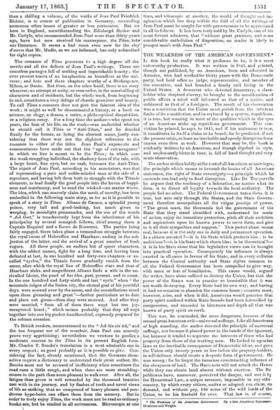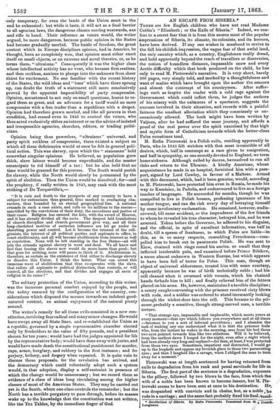THE WEAKNESS OF THE AMERICAN GOVERNMENT.* Ii this book be
really what it professes to be, it is a most noteworthy production. It was written in 1845, and printed, though not published, by an American, born and educated its America, who had worked for thirty years with the Democratic party, had held office as judge, representative, and member of the executive, and had founded a family still living in the United States. A democrat who detested democracy, a slave- holder who despised slavery, lie brought to the consideration of public affairs a mind well informed as that of a native, and unbiassed as that of a foreigner. The result of his observation was a conviction that the Union must perish from the inherent faults of its constitution, and be replaced by a system, republican, it is true, but wanting in most of the qualities which in the eyes of an American niake up republican government. This con- viction be printed, he says, in 1845, and if his statement is true, it constitutes in itself a claim to be heard; for he predicted, if not the present crisis, at least an inevitable and speedy disruption from causes even then at work. However that may be, the book is evidently written by an American, and though slipshod in style, and unpleasantly bitter in tone, is full of hard thought and very acute observation.
The author strikes boldly at the root of all Am erican miscan iagee, the principle which seems to benumb the brains of all American statesmen, the right of State sovereignty—a principle which he contends can lead only to final disruption. Like De Tocqueville he argues that the tendency of a federation, no matter what its form, is to direct all loyalty towards the local authority. The people feel no other. The Federal Government taxes them, it is true, but acts only through the States, and the State Govern- ment therefore monopolizes all the vulgar prestige of power. "The great mass, the thousands feel the government of the State that they stand identified with, understand its mode of action, enjoy its immediate protection, pitch all their ambition and aspirations upon its known power to serve them, and give to it all their sympathies and support." This power alone seems real, because it is the only one in daily and permanent operation. Is a citizen arrested ?—it is his State which protects him ; is he ambitious ?—it is his State which elects him; is he theoretical ?— it is in his State alone that his legislative views can be brought into practical operation. Consequently his influence is always exerted in all cases in favour of his State, and in every collision between the Central authority and State rights common to all, the Federal Government has been compelled to give way, with more or less of humiliation. This cause would, argued the writer, have alone sufficed to destroy the Union, but that the power of the States was in practice so irresistible that it was not worth destroying. Every State had its own way, and having it, had no occasion to abandon the common home; occasion must, however, arise, and when it did, Americans would perceive that party spirit confined within State bounds had been intensified by compression, and exceeded in bitterness and depth all that was known of party spirit on earth.
This was, he contended, the more dangerous, because of the second great American evil—universal suffrage. Like all Americans of high standing, the author detested the principle of universal suffrage, not because it placed power in the hands of the ignorant, but because it tended to separate the interests of those who had property from those of the working men. He looked to agrarian laws as the inevitable consequence of Democratic ideas, and gave the Union only twenty years to live before the property-holders, in self-defence, should create a despotic form of government. He was wrong ; for he forgot the immense counteracting influence of the cheapness of land. The Have-nots will not attack the Haves while they can obtain land almost without exertion. The Re publicans have, moreover, perceived the danger, and met it b3 the Homestead Law, a unique measure, impossible in any othe country, by which every citizen, native or adopted, can claim, on demand, and without pay, 150 acres of the wild lands of the Union, to be his freehold for ever. That law is, of course,
* The Weakness of the American Government. Bin. Lao Americas Statesman. Houlston and Wright.
only temporary, for even the lands of the Union must in the end be exhausted ; but while it lasts, it will act as a final barrier to all agrarian laws, the dangerous classes moving westwards, axe and rifle in hand. Their influence as voters would, the writer argued, be more dangerous, because public opinion in the States had become gradually morbid. The battle of freedom, the great contest which in Europe disciplines opinion, had in America, he thought, been so completely won, that opinion must either exert itself on small objects, or on extreme and novel theories, or, as he terms them, " ultraisms." Consequently it was the higher class whose intellectual activity has no vent, who became first restless, and then reckless, anxious to plunge into the unknown from sheer thirst for excitement. No one familiar with the recent history of the States, the wild ideas and "isms" which have there sprung up, can doubt the truth of a statement still more conclusively proved by the apparent impossibility of party compromise. Opinion, accustomed to act only on small questions, learnt to re- gard them as great, and an advocate for a tariff would no more compromise with a free trader than a republican with a despot. Opinion had therefore grown morbid, and like all powers in that condition, had ceased even in 1845 to control the voters, who thus acted exclusively either on interest or on the advice of isolated and irresponsible agencies, churches, editors, or trading politi- cians.
Opinion being thus powerless, " ultraisms " universal, and party spirit reckless of compromise, there existed a subject on which all these deficiencies would at once be felt in general poli- tical action. This was slavery, upon which the " statesman" held somewhat singular opinions. He believed, as population grew thick, slave labour would become unprofitable, and the master emancipate to rid himself of a tax ; but he also held that no time would be granted for this process. The South would perish for slavery, while the North would slowly be permeated by the spirit of abolition. Then the Union would be dissolved ; for—and the prophecy, if really written in 1845, may rank with the most striking of De Tocqueville's,—
"It is ruin and death to the prospects of any country to have a subject for enthusiasm thus general, thus marked in everlasting cha- racters, thus bounded by an eternal geographical line. A national crusade in such a case exists, and rolls on its millions to the rescue— sanctified by the convictions of their duty, the sacredness and justice of their cause. Religion has entered the lists, with the sword of Heaven, and it has already divided all the sects. The deepest laid foundations of church discipline and church government give way, and all their long-cherished motives of sectarian influence are let go under its absorbing power and control. Let it become the interest of the reli- gionists, the interest of all political parties and aspirants to office, to court abolitionists, and all will become abolitionists from interest as well as conviction. None will be left standing in the free States—ail will join the crusade against slavery in word and deed. We all know and feel that freeing the slaves now would do more harm than good ; but that goes for nothing, none will pause to think of it. Abolitionism is, therefore, as certain as the existence of God either to discharge slavery or dissolve this Union. I think the latter. What can arrest this immense wave of abolitionism that thus co-operates with the slave, that enlists all aspirants to political distinction, that controls, or will control, all the elections, and that divides and engages all sects of religion in its cause ?"
The solitary protection of the Union, according to this writer, was the immense personal comfort enjoyed by the people, and the safety ensured by the configuration of the country, con- siderations which disposed the masses towards an indolent good- natured content, an animal enjoyment of the natural plenty around.
The writer's remedy for all these evils consisted in a new con- stitution, involving fourradical and many minor changes. He would lave swept away all State lines, and re-established the Union as a republic, governed by a single representative chamber elected only by freeholders to the value of fifty pounds, and a president chosen for ten years; would have had the judges appointed for life by the representative body; would have done away with juries, and would have made death the constitutional punishment for murder, rape, arson, burglary, and robbery in the first instance ; and for perjury, bribery, and forgery when repeated. It is quite vain to discuss these proposals, for the revolution has arrived, and the democracy which could voluntarily adopt such a system would, in that adoption, display a self-restraint in presence of which the change would be unnecessary ; but we record them as evidence of a class of ideas long circulating among the higher classes of most of the American States. They may be carried out yet in the South, where one class controls the remainder; but the Nortb has a terrible purgatory to pass through, before its masses wake up to the knowledge that the constitution was not written, like the Ten Tables, by the immediate finger of God.































 Previous page
Previous page